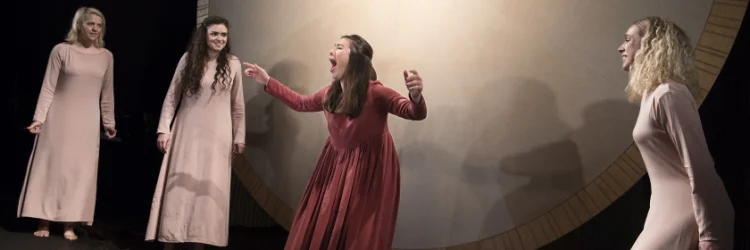Review of Lincoln Center Theater's LCT3 production of In the Green
Being a kid in medieval Germany was no day at the beach, especially if you were Hildegard von Bingen. The youngest among 10 siblings, her parents sacrificed her to the Catholic Church when she was eight, and she spent the next 30 years locked away in a dark cell. She would emerge, circa 1136, to become a devout nun as well as a gifted writer, composer, and botanist who also performed exorcisms and had Godly visions. Nearly 900 years later she was declared a saint. Perhaps sensing that Hildegard would not be the easiest human with which to identify, playwright, actor and songwriter Grace McLean, in her new musical In the Green, at Lincoln Center Theater's Claire Tow Theater, turns the tale inward. Focusing on those three decades removed from society, McLean, utilizing enrapturing orchestral techniques, poetics and a giant prop eyeball, deconstructs the girl's life, breaking her into pieces for our examination.
As directed by Lee Sunday Evans, Hildegard is portrayed simultaneously by three different actors (Rachael Duddy clutching that eyeball, Ashley Pérez Flanagan holding a pair of wooden lips, and Hannah Whitney operating a large puppet hand). They all sing admirably while the staging device, intentionally or not, keeps us from growing too sympathetic toward the character. And if a trio of performers singing as one seems like a suddenly familiar theatrical gambit, don't worry. This is no clone of The Cher Show; it's the unveiling of a shared soul. Singing in harmony or taking turns with solos, the women demonstrate how Hildegard didn't so much grow up as grow down. When you are in a prison there is not much to do but dig, so shovel they do, both literally and metaphorically, unearthing a hole in the stage floor while struggling to become a whole woman. This hole/whole pairing is just one example of the spiritual wordplay at work. As the evening progresses, McLean displays the light within enlightenment and finds the dead in dedication, while exploring the many ways a woman conceptualizes her own body.
Hildegard is not alone with her selves in the cell, there is also Jutta (McLean) an older woman who had voluntarily sentenced herself to solitude and who became Hildegard's mentor. Her lessons generally revolve around the idea that being gone is the best way of being here. Or as she puts it, "You have nothing to lose if everything's gone/When life is darkness, death is dawn/Life is better in death." McLean's singing style is captivating and she elevates her performance with a nifty bit of technology. Often letting loose with a stream of utterances or other haunting mouth noises, she is wired up with a device that allows her to instantly record and play the tones over and over in a loop, providing an eerie and appropriately lonely sounding self-accompaniment. Meanwhile, a band of four musicians, just barely visible offstage, perform in near darkness. Ada Westfall, while simultaneously playing bass or keyboards, conducts with brisk precision, creating a compelling visual as well as audio contrast to McLean's languid presence.
(Photo by Julieta Cervantes)
WHAT THE OTHER CRITICS SAID
"Don't look for God within the cloisters of In the Green, Grace McLean's oddball musical portrait of the sainted medieval nun, theologist and composer Hildegard von Bingen. Though Hildegard (1098-1179) was celebrated for having a direct line to the almighty, via holy visions, the Judeo-Christian deity is invoked but briefly in this LCT3 production, and then only as an interjection (as in "oh, God, I'm suffocating")."
Ben Brantley for New York Times
"Director Lee Sunday Evans can't liven up the inaction, which basically amounts to Jutta and Hildegard going in literal and figurative circles as they debate such questions as dark versus light, life versus death, broken versus whole. An abrupt and seemingly tacked-on ending briefly shows Hildegard's post-Jutta existence and hints that In the Green needed more time to ripen. Just as Hildegard's potential was apparent to Jutta, however, McLean's promise shines through this fascinating if flawed experiment."
Raven Snook for Time Out New York
Originally published on
